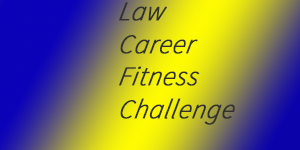Law Career Fitness Challenge #8- Stop Losing Your Car Keys
 How can you expect to have a great career if you keep losing your car keys?
How can you expect to have a great career if you keep losing your car keys?
Or your house or office keys? Or your wallet or smartphone or online banking password, for that matter? Or, heaven forbid, a client file?
Chances are you’ve misplaced at least one of these items in the recent past. So you know the feeling. It throws you off your game. You waste time, energy and, sometimes, money searching for the lost object. You lose your patience and composure. You might also lose your job.
The remedy, of course, is to be organized.
That’s not easy for everyone. Decluttering is not taught in law school. And for some people, clutter is a way of life. This is not always a bad thing. Some studies show that certain personality types are more creative and productive in a chaotic work environment. Psychologists call this the “messy desk” phenomenon.
But if your mess causes you to mess up – by making a mistake, missing an appointment or neglecting an important matter – then you’ve got a problem.
Disorganization Leads to Blown Deadlines
Year in and year out, a leading cause of malpractice claims at Lawyers Mutual is missed deadlines like statutes of limitation. Lawyers hit with these claims are not incompetent or unqualified. They simply lack effective systems and procedures to prevent important dates from slipping through the cracks.
There are lots of time management and office organizing tools that can keep you on track. But you don’t need to buy a new app to protect yourself against unforced errors.
Often, you simply need to pay attention. Take the matter of lost keys. Experts advise pausing a second before putting your keys down to snap a mental picture of the location. Is it a desk or a counter? Wood or metal surface? These contextual details will help you recall the spot later.
“You can think of the process our brains use to form a memory as working (roughly) like a camera: the person, place, or thing we remember gets stored, like a snapshot, in a specific set of brain cells in our hippocampus,” says this source. “Misplacing everyday objects is normal, especially when we aren’t paying attention to where we put something in the first place. When you put down that pen, for example, were you focused on putting down the pen, or were you thinking of something else, like phone call you were about to answer? If your brain wasn’t paying attention to where you were putting the pen, it didn’t get a chance to store, or encode, the memory properly.”
Another tip: become a creature of habit. Designate stash zones for important items. Keeping things in the same place all the time will cut losses.
Five Training Tips
- Practice uni-tasking. Doing too many things at once is distracting. You will get more done if you focus on one job at a time, and you will make fewer mistakes. By the same token, avoid distractions by switching off popup notifications on your computer when you’re deep into an important project.
- Use memory tricks. Try saying “KEW-P” before leaving home, to remind yourself not to forget your keys, eyeglasses, wallet and phone.
- Use checklists. There’s a reason airline pilots use the same checklist before taking off even though they have flown successfully for years. The checklist removes memory from the equation.
- Get plenty of rest. Schedule breaks during the day. Take a nap at lunch. You forget things when you are tired.
- Delegate and use backup systems. Ask your partner or colleague to help remind you of important dates. Set your alarm clock. Enter deadlines on your Google calendar and a backup desk calendar.
Sources:
- Business Insider http://www.businessinsider.com/how-to-improve-memory-2014-12
- Entrepreneur http://www.entrepreneur.com/article/242359
- American Psychological Association http://www.apa.org/monitor/2013/10/messy-desk.aspx




